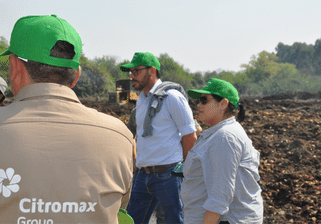
Sep
Recycling organic waste
Last Wednesday, August 31, 2022, we hosted an organic waste revaluation meeting and received members from the National Organic Valorization Program (PROVO) belonging to the Ministry of Environment and Sustainable Development of the Nation (MAyDS): Ing. Pamela Natan, National Coordinator of the Program, and the technical advisers, Ing. Patricia Fernández Caña, Edith Ibañez and Ing. Walter Ordinas.
PROVO is a national program that aims to identify, systematize, qualify and quantify the sources of organic waste generation, in order to establish strategies for its recovery and for the reinsertion of the products and by-products derived from it. The program is developed under the Directorate of Environmental Quality and Recomposition (DCAyR), of the Undersecretariat for Control and Recomposition belonging to the MAyDS Environmental Control and Monitoring Secretariat.
The team began the day by visiting our industrial organic waste composting yard, located at the Acheral Plant. The visit was guided by our Operations Director Fernando Carrera, Operations Coordinator Sebastian Couto, Environment and Sustainability Manager Rodolfo Arrueta, Management Systems Manager Christian Hamilton and Environmental Irrigation Manager Daniel Aragón. The purpose was to exchange good practices to improve the management of organic solid waste treated in our composting yard, where 100% of the organic waste originating throughout the lemon production process is composted.
Later, the agricultural division, structure and operations of Citromax SACI responsible for the management of organic waste, shared with all attendees their experiences in the management and production of compost. The first experience was led by the Environment Supervisor Jose Molina, who shared the path we went through.
The revaluation of organic waste through composting is a transversal and holistic line of work aligned with our Environmental and Sustainability policies.
The project began in 2021 with an awareness stage adapted to the needs, resources, infrastructure, human capital and conjunctural realities of each of the company’s areas. The staff directly involved with the composting task was instructed in technical concepts seeking a gradual scaling and pursuing continuous improvement as the sole objective by optimizing each of the processes.
For that purpose, our Environment and Sustainability Department designed, using disused materials from the industrial area, 7 compost bins strategically located at each of Citromax SACI’s organic waste generation points, specially adapted to the generation volumes of the Organic Fraction of Urban Solid Waste (FORSU). Thanks to a strategic alliance with INTA Famaillá – Monteros Rural Extension Agency, we were provided with advice and coach in the incorporation of Californian worms to the 2 composters located in the Acheral Plant, improving the treatment of the FORSU generated there.
During the workshop we opened our agro ecological garden to more than 40 guests directly related to the revaluation of organic waste belonging to public organizations such as the Obispo Colombres Agroindustrial Experimental Station (EEAOC) and the Rural Extension Agency of Monteros of the Institute National Institute of Agricultural Technology (INTA), the Environment Directorate of the Municipality of Monteros, the Acheral Commune and schools belonging to our Sustainable Institutions Program such as the Rio Seco Technical School, the Villa Quinteros Institute of Higher Studies, the Center Educational Therapeutic of Concepción and the School of Commerce of Acheral. Private suppliers who provide services at our composting yard and colleagues from the industry, such as the environment, hygiene and safety area of the San Miguel citrus company, also attended.
The workshop successfully fulfilled the objective of providing a networking space for sharing best practices between public actors, schools and institutions in the area of influence, and private companies in the agro-industrial sector, all involved in the mission of reevaluating organic waste. Acting as promoters of strategic interaction, environmental awareness, internalization of technical concepts and institutional experiences on the convening theme.
Author: Milagro Peralta
Edition: Estefanía Scuka
©CitromaxGroup









